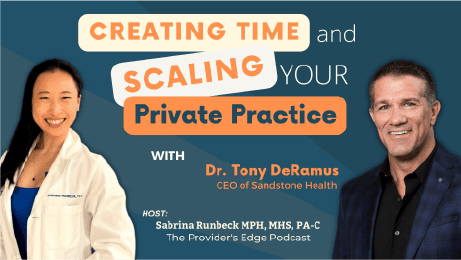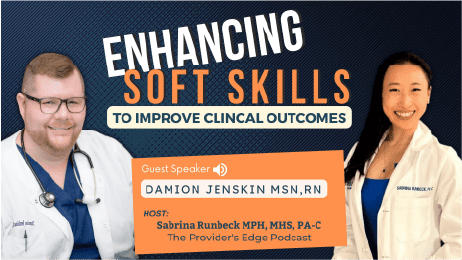
Create Your Ultimate Anti-Burnout System
For Your Loved Ones' Sake
Are you wondering how to maintain a strong relationship with your partner, even when your private practice gets super busy?As you very well know, your private practice demands a lot of your time and attention. When times get busy and hectic, it is easy for your relationship with your partner to fall by the wayside. Without any kind of disruption or intervention, separation or divorce is on the horizon. Here is some good news: You can have a thriving romantic partnership without sacrificing your career. In fact, the key to creating an anti-burnout system for yourself is by having strong relationships. Let me show you how in our next podcast episode!In this episode, I speak with Uwe Duckhorn, the Lifestyle Liberator. Together, we discuss the ups and downs of relationship issues within high-performing partnerships and families and what they can do to always see eye-to-eye. He has personally conducted over 17,000 successful sessions with his proprietary process to bring couples closer together in a short amount of time.
Listen anywhere you get your podcastin' on.
Live Interview

Show Summary
Burnout is a state of physical, emotional, and mental exhaustion and it’s something that you must work on before it happens. It is often caused by chronic stress and can lead to feelings of irritability, anxiety, and depression. Burnout can get the best of you, even when you have great passion for your work. It often results from a misalignment of input and output; an imbalance. You’re experiencing burn out when you feel like you’re putting more into your work than you’re getting out of it. Sometimes this happens when a job isn’t rewarding, but more often than not it’s because you aren’t taking care of yourself.
To prevent burnout, it is important to focus on self-care. This means taking time for yourself – to relax, exercise, and connect with friends and family. It also means being honest with yourself about your limits and setting boundaries with work. If you find yourself feeling burnt out, it is important to reach out for help – whether that means talking to a therapist or simply taking a break from work.
Burnout is a serious problem, but it doesn’t have to be a permanent state. With awareness and effort, it is possible to prevent and recover from burnout. Here are the some steps to help you create an anti-burnout system:
- Make other things a priority in your life. Care, cherish and prioritize your partner and your family just as much as you do for your career. The relationships of the people who are closest to you are not only the most meaningful but have the power to be the most supportive, especially during times of high stress. Your relationships are the key to creating your anti-burnout system.
2. As high-performing professionals, don’t get caught up in “what’s next” all the time. This way of thinking not only prevents you from being present to your wants and needs but it also impacts the way you are at home. Your partner and family can clearly see when your mind is somewhere else, which can cause imbalance and conflict in the relationships. Practice putting away your “work hat” when you get home so you can stop the noise in your head and be fully focused on your household.
3. Develop a healthy relationship with yourself and focus on other relationships in your life. Your relationship with yourself impacts the well-being of your other relationships. When you are happy, everyone else is happy too. When you are burned out, however, that opens the door to anxiety and tension in the household. If you want any easy way to fix your relationships, focus on your relationship with yourself first. When you find yourself again, that will create a ripple effect for your partner and your family.
4. Don’t try to fix everything with logic. In school, you were often taught to look for systems and solutions right away. When it comes to improving your relationship to yourself and your partner, jumping to solutions too quickly could actually backfire because it does not take emotions into account. When you are stressed out, take the time to take in yours and your partner’s emotions, perceive your surroundings and then move forward.
5. Focus on your partner’s aspirations as they have goals too. They have dreams that are outside of your career. Listen to your partner to figure out what is important to them and then figure out how you two can work together to work on your individual achievements.
This article is a summary of my conversation with Uwe Duckhorn on episode #16 of the Provider's Edge Podcast. Subscribe ? and listen ?to the entire discussion now❗The Provider’s Edge is here to support you and help you elevate your success as a healthcare leader and practice owner.Want to grow your visibility where your messages are heard by thousands of healthcare leaders and healthpreneurs like you so you can establish your authority in the field immediately? Click here to apply as a speaker for our show: SabrinaRunbeck.com/Interviews
Recommended Podcast Episodes
Ep 55
Embracing Food Identify:Healing modern-day gut issues through traditional healing foods with Dr Sara
Be a guest on our show
Powerful and Passionate Healthcare Professionals Podcast is always looking to feature healthcare private practice owners to highlight their work and their stories.
Together, we can encourage other practitioners to up level their practices.If you or someone you know could be a good fit as a guest on the show,please click on the bottom below to apply as a speaker.
Healthcare Private Practice Owners
I can help you run a peak performance team while gaining you a day per week!After overcoming burnout working in surgery, I went back to my roots in neuroscience and public health helping healthcare practice owners and their teams to develop mental immunity so they can do less, achieve higher, and enjoy more.My clients stop having endless to-do lists, constantly putting out fires, or are not able to move steadily forward.If you want to gain a day per week and increase your team’s productivity... then you have landed on the right page, with the right consultant who is also a recovered clinician.




